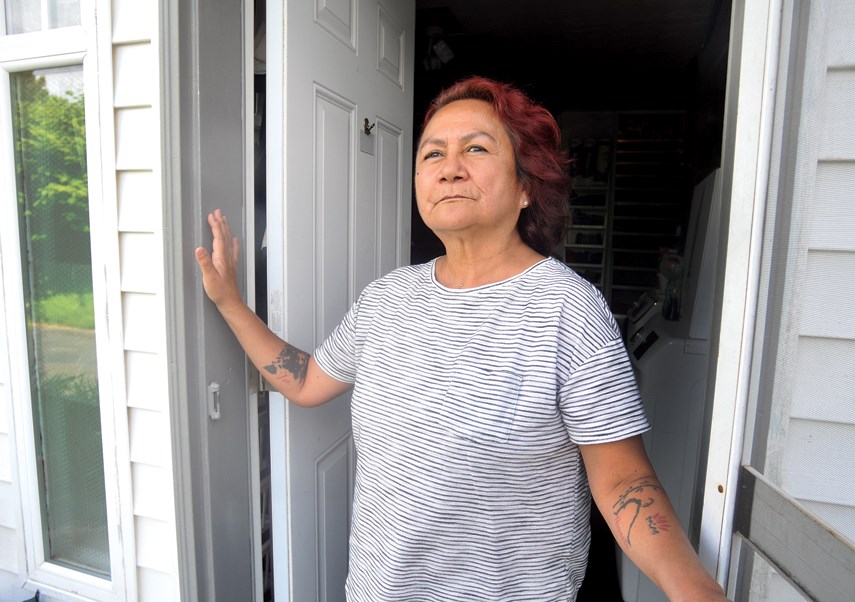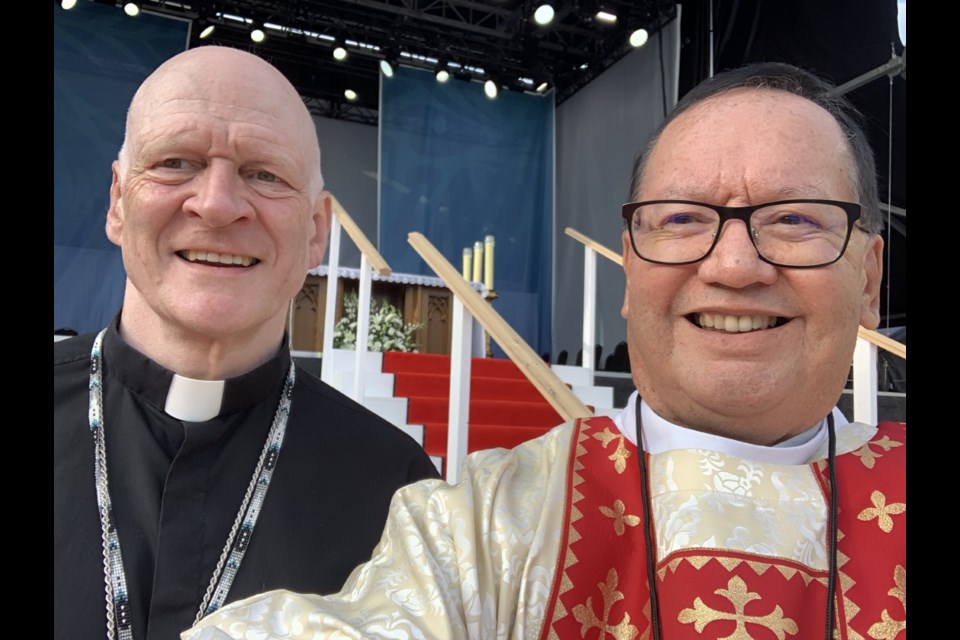As Sḵwx̱wú7mesh (Squamish) Elder and Catholic Church Deacon Rennie Nahanee sat near to Pope Francis July 25 listening to the pontiff offer a apology for the “deplorable evil” of residential schools, he found his thoughts turning to those who hadn’t lived to hear it.
“I was thinking of my parents who went to residential school and my siblings, and my two sisters who have passed away,” said Nahanee. “And my eyes started watering as I was listening to his apology and I kind of wished they were there to hear that.”
Speaking near the site of two former residential schools in Alberta, the Pope offered an apology this week to Indigenous people for the church’s role in the residential school system where Indigenous children were abused.
“I am deeply sorry,” Francis said, calling the forced cultural assimilation practised by residential schools a “disastrous error.”
“I humbly beg forgiveness for the evil committed by so many Christians against the Indigenous peoples,” Francis said.
The apology was part of what the Vatican described as a “pilgrimage of healing and reconciliation” prompted by a request to visit from Indigenous leaders last year. The request followed the discovery of the remains of 215 Indigenous children at the Kamloops Indian Residential School in B.C.
Apology was 'genuine', says Rennie Nahanee
A week before the event, Nahanee received an invitation to be one of the Indigenous Catholic church leaders to witness the mass. Nahanee said the Pope shook each of their hands as he approached the altar and gave them each a rosary, describing the experience of being present for the apology as a “once in a lifetime” event.
Nahanee said he felt the Pope’s apology was genuine. “You could just feel in your heart when somebody is speaking genuinely, not just making something up,” he said.
For Nahanee, the Pope’s decision to come to Canada and apologize directly to Indigenous people was significant, noting it is one of the actions called for by Canada’s Truth and Reconciliation Commission.
“There’s a big difference between him apologizing at the Vatican in Rome and him being here,” he said.
Continued actions also key
Nahanee said continued action by the church is also important.
“And it's different for each and every person who was affected by the residential schools,” he said. “It's not a blanket thing that they heard the words and now everything's going be okay. There have to be some actions there.”
Nahanee said he hopes the Pope’s message will influence Catholics and other Christians to learn the history of residential schools and to donate to the $30 million fund Catholic bishops are raising to pay for reconciliation projects.
Nahanee said his own work will continue to focus on bringing Indigenous language and culture into St. Paul’s Church, both through mass, but also funerals conducted in the Sḵwx̱wú7mesh Sníchim (Squamish language.)
Nahanee said he had to work on his own healing from residential school, “because the people that bothered me when I was young had passed away, so I had to forgive them and move on with my life,” he said.
Not everyone had the same reaction to the Pope's apology.

'Too little, too late' says residential school survivor
Squamish member Jo-Ann Nahanee, Rennie Nahanee’s cousin and survivor of the Kamloops residential school, said the apology is meaningless without action to back it up.
“His apology means nothing to me,” she said. “He hasn’t said anything about what he will do in the future... For me it’s a little bit too late."
Jo-Ann Nahanee said she disagreed with the choice by some Indigenous leaders to present the pontiff with a headdress. She added she would also like to hear the Pope acknowledge specific harms like “the physical abuse, the sexual abuse the emotional abuse."
"Call it what it is,” she said.
She said she would also like to see the church do more to release records from the residential schools .
Last year, following the discovery of the remains of children at the Kamloops residential school, Nahanee shared the stories of her own abuse at that school and witnessing the abuse of other children there for the first time with her brother.
“It’s still difficult to share,” she said.
Jo-Ann Nahanee said the residential school system impacted a wide swath of her family relationships, including those with her parents, siblings and with her own children. That has taken 33 years of effort to overcome, she said.
But that work has been long and hard, she said.
[email protected]
twitter.com/JaneSeyd
Support and assistance for those who are affected by the residential school system can be found at Indian Residential School Survivors Society toll-free 1 (800) 721-0066 or 24-hr Crisis Line 1 (866) 925-4419.




